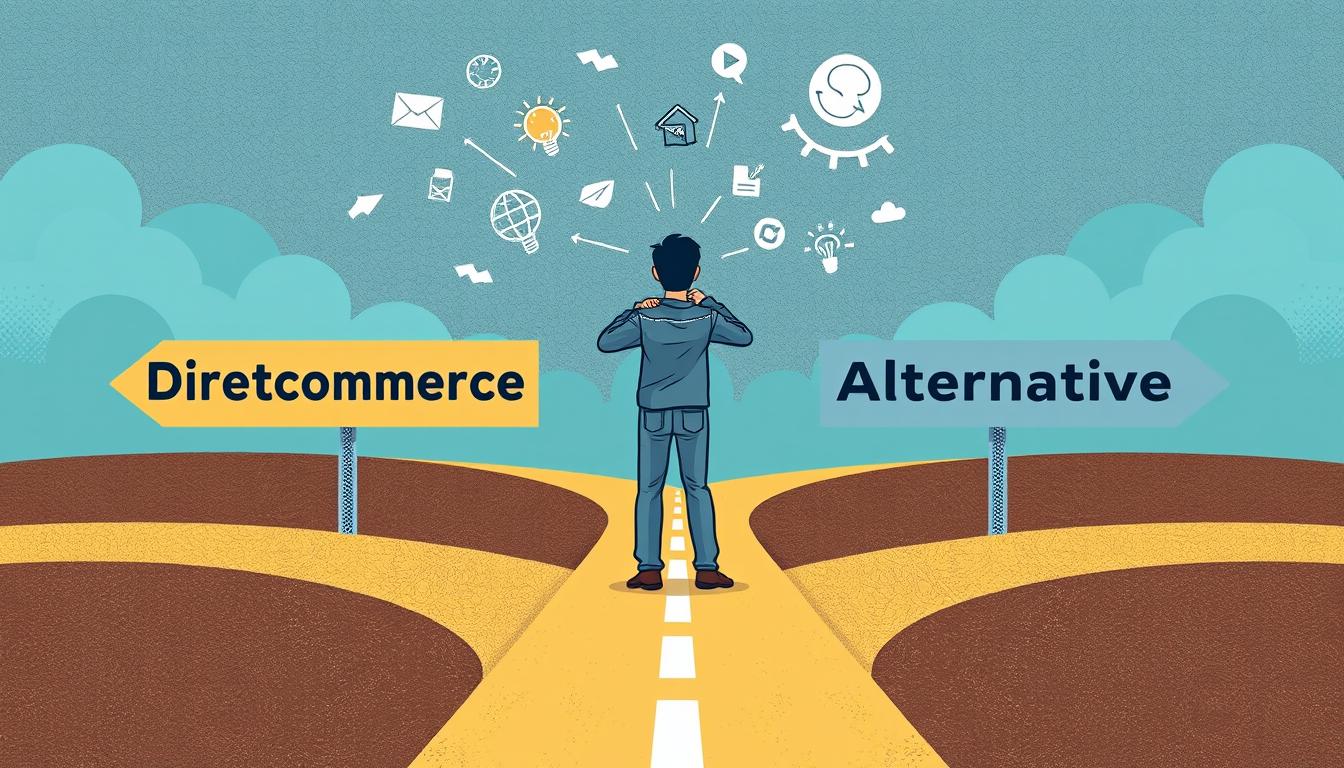E-commerce businesses constantly seek new ways to improve online operations. Directcommerce is a popular platform for many retailers. However, the search for alternatives has become more important as business needs change.
Many companies now look for reliable Directcommerce alternatives. These options can help them stay competitive in the fast-paced online market.
We’ll explore top Directcommerce alternatives in this guide. We’ll analyze their features, pricing, and user experiences. This information will help you choose the best platform for your e-commerce needs.
Our guide suits both established online stores and new entrepreneurs. You’ll gain insights to make an informed decision about your e-commerce platform.
Key Takeaways
- Discover the limitations of Directcommerce and the evolving business requirements that drive the need for alternative solutions.
- Evaluate the top-rated Directcommerce alternatives, comparing their features, pricing, and cost-effectiveness.
- Learn about industry-specific solutions and how to seamlessly transition your online store from Directcommerce to a new platform.
- Understand how to leverage AI and automation to enhance the efficiency and performance of your e-commerce operations.
- Gain insights from real-world customer success stories, helping you make an informed decision on the best Directcommerce alternative for your business.
Understanding the Need for a Directcommerce Alternative
Businesses are noticing Directcommerce’s shortcomings as e-commerce grows. They’re looking for more flexible options to meet their changing needs. Let’s explore why switching platforms might be necessary.
Limitations of Directcommerce
Directcommerce has been popular, but it has drawbacks that can slow growth. Its rigid structure makes customization and scaling difficult. The platform also lacks seamless integration with other business tools.
Directcommerce’s outdated user experience can hurt customer engagement. It also lacks advanced features like robust analytics, personalization, and omnichannel capabilities.
- Rigid and inflexible platform structure, making it challenging to customize and scale as business needs evolve.
- Limited integration capabilities, hampering the ability to seamlessly connect with other essential business tools and systems.
- Outdated user experience, which can negatively impact customer engagement and satisfaction.
- Lack of advanced features and functionalities, such as robust analytics, personalization, and omnichannel capabilities.
Evolving Business Requirements
E-commerce is changing, bringing new challenges that Directcommerce struggles to address. Businesses need better data-driven decision-making tools and advanced analytics. They also want to offer personalized experiences to meet growing customer expectations.
Omnichannel commerce is rising, requiring smooth integration of online and offline sales. Companies seek platforms that can adapt quickly to their changing needs.
- The need for enhanced data-driven decision-making, enabled by advanced analytics and reporting tools.
- Increased demand for personalized customer experiences, driven by the growing expectation of tailored products and services.
- The rise of omnichannel commerce, requiring the ability to seamlessly integrate online and offline sales channels.
- The importance of agility and scalability, as businesses seek platforms that can adapt to their evolving needs.
These new business needs, along with Directcommerce’s limits, show why a better e-commerce solution is needed. Companies want versatile platforms that can handle today’s dynamic market.
Directcommerce Alternative: Evaluating the Possibilities
Finding the right Directcommerce alternative is crucial for e-commerce success. Businesses need to evaluate options carefully to meet their unique needs. This task can be challenging, but focusing on key features helps make informed decisions.
When looking at alternatives, consider several important factors. Features and functionalities determine your online management capabilities. Ease of use ensures a smooth experience for you and your customers.
The scalability of the platform is also vital. Your e-commerce needs may grow over time. Choose a platform that can handle increased traffic, products, and customer demands.
| Feature | Importance | Directcommerce Alternative 1 | Directcommerce Alternative 2 | Directcommerce Alternative 3 |
|---|---|---|---|---|
| Customizable Design | High | ✓ | ✓ | ✓ |
| Inventory Management | High | ✓ | ✓ | ✓ |
| Multichannel Integration | Medium | ✓ | ✓ | – |
| Automated Shipping | High | ✓ | ✓ | ✓ |
| Reporting and Analytics | High | ✓ | ✓ | ✓ |
Evaluate the features to look for in each platform carefully. Compare ecommerce platforms to find the best fit for your business. The right choice will drive your online success and growth.
Top-Rated Directcommerce Alternatives
Finding a suitable alternative to Directcommerce is essential for evolving businesses. The market offers various options with unique features and pricing structures. Let’s explore top-rated Directcommerce alternatives to help you make an informed decision.
Comprehensive Feature Comparison
Consider the features that matter most to your business when evaluating alternatives. Here’s a detailed comparison of key functionalities offered by leading platforms:
| Feature | Platform A | Platform B | Platform C |
|---|---|---|---|
| Ecommerce Capabilities | ✓ | ✓ | ✓ |
| Inventory Management | ✓ | ✓ | ✓ |
| Multichannel Integration | ✓ | ✓ | – |
| Automated Reporting | ✓ | – | ✓ |
| Customizable Branding | ✓ | ✓ | ✓ |
Pricing and Cost-Effectiveness
The pricing and cost-effectiveness of alternatives are crucial factors to consider. Here’s a breakdown of pricing structures for top options:
- Platform A: Starting at $99 per month, with additional charges based on monthly sales volume.
- Platform B: Tiered pricing plans ranging from $29 to $299 per month, catering to businesses of various sizes.
- Platform C: A flexible, usage-based pricing model with no fixed monthly fees, making it a cost-effective choice for businesses with fluctuating sales.
Evaluate features, pricing, and overall cost-effectiveness carefully. This will help you choose the best Directcommerce alternative for your business needs and budget.
Seamless Migration: Transitioning from Directcommerce
Moving from Directcommerce to a new platform can be challenging. However, proper planning can make the process smooth and efficient. A well-thought-out strategy ensures a successful transition for businesses.
Data Transfer and Integration Strategies
The main hurdle in migrating from Directcommerce is data transfer. This includes customer info, order history, product catalogs, and financial records. Secure and accurate data migration is crucial.
To achieve this, consider these strategies. First, audit your Directcommerce data thoroughly. Identify all necessary information for migration. Then, create a detailed plan with steps, timelines, and responsibilities.
Use data migration tools to automate the process. This ensures data integrity. Finally, integrate the new platform with existing systems. This maintains a smooth workflow.
- Conduct a thorough audit of your Directcommerce data to identify all the necessary information that needs to be migrated.
- Develop a detailed data migration plan that outlines the steps, timelines, and responsibilities for the transfer process.
- Utilize data migration tools and services that can automate the process and ensure the integrity of your data.
- Integrate the new platform with your existing systems, such as accounting software or CRM, to maintain a cohesive and streamlined workflow.
Careful planning minimizes business disruptions during the transition. It sets the stage for a successful move to your new platform.

“Transitioning from Directcommerce to a new platform can be a game-changer for businesses looking to stay ahead of the curve. With the right data migration and integration strategies, this process can be seamless and set the stage for long-term growth and success.”
Directcommerce Alternative: Industry-Specific Solutions
Ecommerce solutions aren’t one-size-fits-all. Different industries need tailored industry-specific ecommerce solutions. A good Directcommerce alternative should meet these specialized needs for effective digital transformation.
Various sectors require unique features to address their challenges. These specialized platforms offer tools to streamline operations and boost growth. They enhance customer experiences in their specific markets.
Retail-Focused Directcommerce Alternatives
- Omnichannel capabilities for seamless customer journeys
- Advanced inventory management and order fulfillment
- Personalized product recommendations and targeted marketing
Manufacturing-Centric Directcommerce Alternatives
- Streamlined B2B ordering and quoting processes
- Integrated supply chain management and logistics
- Robust product configurators and custom pricing
Industry-specific ecommerce solutions boost efficiency and customer satisfaction. They give businesses a competitive edge. These solutions set companies up for long-term success in their markets.
“The key to thriving in today’s ecommerce landscape is understanding the unique needs of your industry and finding a Directcommerce alternative that addresses them head-on.”
Choosing the Right Directcommerce Alternative for Your Business
Finding the best Directcommerce alternative requires a careful look at your business needs. By examining options, you can pick a solution that fits your goals. This choice can boost your business growth and success.
Assessing Your Unique Needs
Start by looking at your current operations and identifying problems. Determine the key features you need in a Directcommerce alternative. This approach will help you make a smart choice.
Consider these factors when choosing an alternative:
- Scalability: Ensure the solution can grow with your business. It should handle more transactions, products, and customers over time.
- Integrations: Check if the platform works well with your existing software. This includes accounting, inventory, and customer relationship management tools.
- Reporting and Analytics: Look for a solution that offers detailed reports and data insights. These help you make better decisions.
- User Experience: Choose a platform that’s easy to use. It should work well for both employees and customers.
- Security and Compliance: Pick an alternative that follows industry standards. It should protect your data and customer information.
By carefully checking your needs, you can compare Directcommerce alternatives with confidence. This helps you choose the best option for your company’s future.

Directcommerce Alternative: Leveraging AI and Automation
AI and automation are changing e-commerce. These tools boost efficiency and personalization for businesses. They help companies stay competitive in a fast-paced market.
Directcommerce alternatives use AI to improve operations. AI chatbots handle customer questions quickly. This frees up staff for more complex tasks.
Automated systems manage inventory better. They reduce stockouts and ensure smooth order fulfillment. This improves the overall customer experience.
Directcommerce alternatives with advanced features use machine learning. These algorithms study customer behavior and preferences. This data helps create personalized product recommendations.
Targeted marketing campaigns become more effective. Tailored content enhances the customer journey. As a result, businesses see higher conversion rates.
| Feature | Benefits |
|---|---|
| AI-powered Chatbots | Efficient customer support, 24/7 availability, and reduced response times |
| Automated Inventory Management | Optimized stock levels, reduced stockouts, and improved order fulfillment |
| Predictive Analytics | Personalized product recommendations, targeted marketing, and data-driven decision-making |
AI and automation in ecommerce drive efficiency and customer satisfaction. These technologies are key for growth. E-commerce businesses need them to stay competitive.
Customer Success Stories: Real-World Experiences
Directcommerce alternatives have transformed businesses across industries. Acme Retail boosted online sales by 35% with a cutting-edge platform. They enhanced customer satisfaction through personalized experiences.
Innovate Tech Solutions used an alternative to manage subscription-based services. They cut operational costs by 20% and improved customer retention. Data-driven insights and automated billing processes made this possible.
In healthcare, HealthCare Solutions simplified medical supply distribution. Their order fulfillment efficiency increased by 25%. This allowed them to focus on delivering high-quality products and services.

